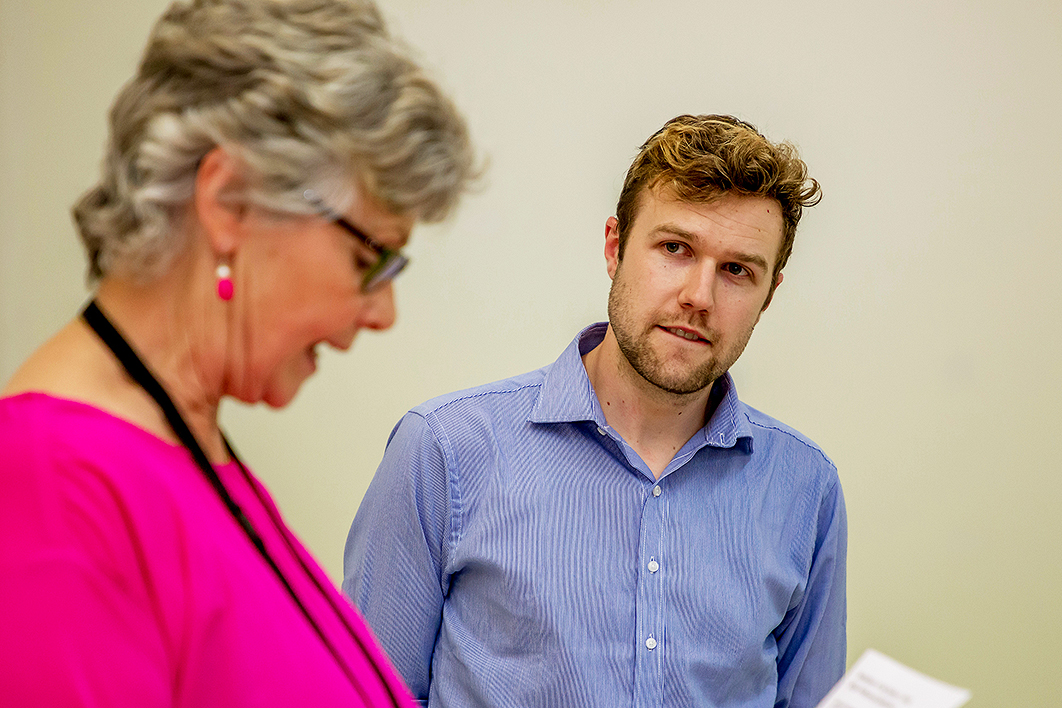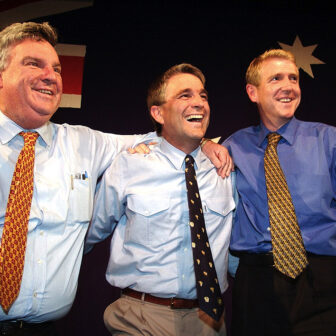When Victoria’s parliament convenes next Wednesday to swear in Daniel Andrews’s new government, the youngest MLA to take a seat will be Labor’s Chris Brayne, the Member for Nepean. Brayne’s win came just three weeks after his twenty-fifth birthday. That doesn’t make him the youngest parliamentarian ever — oddly, perhaps, he’s not even particularly close. Alfred Deakin, for example, was just twenty-two when he first won a seat in the Victorian parliament. Federally, the bar is even lower: when Queenslander Wyatt Roy lost the seat of Longman in July 2016 aged twenty-six, he’d already spent nearly six years in Canberra.
But Nepean’s population median age is fifty-one, and the retiring member, Liberal Martin Dixon, once called it the state’s oldest electorate “by a long shot.” The state’s oldest bunch of voters now has the parliament’s youngest member, and few if any saw it coming.
Before the election, as Brayne told Rafael Epstein on ABC Radio’s local drive program last week, Sportsbet was offering $16 for a Labor win in Nepean, while the Liberal candidate, former Michael Dixon staffer Russell Joseph, was unbackable at $1.01. Despite the odds, though, it would be too strong to call Brayne’s win a fluke. Highly unlikely, yes, but more a perfect storm than an accident.
Labor’s “Danslide” was a major factor, of course, but while Matthew Guy’s tin-eared “Get Back in Control” campaign fell flat, many feel that much of the blame should be shouldered by the feds. Scott Morrison’s health minister, Greg Hunt, whose electorate of Flinders blankets the Nepean state electorate, supported Peter Dutton’s disastrous tilt at the prime ministership. It is now almost impossible to find anyone, except behind the microphone in a Sydney radio station, who thinks that was a wise move.
Incumbency may also have been a problem. Martin Dixon had twenty-two unbroken years at Spring Street, first as the member for Dromana and then, after it was redrawn, as member for Nepean, though he was lucky to get away with a slender win in Steve Bracks’s romp in 2002. While Dixon took the electorate from that 114-vote win in 2002 to “safe” during the rest of his tenure, the 2014 election saw his margin drop from 14.4 per cent to 7.6 per cent. On top of that, and by his own admission, the people he was representing had long been neglected by the managers of the public purse.
To be fair to Dixon, more than two-thirds of his time was spent in opposition, and seemingly safe seats on the wrong side of the parliamentary aisle are rare targets for governmental largesse. But if such a perception, justified or otherwise, seeps deep enough for long enough, then eventually something might just give.
Enter Chris Brayne. At the time of writing, Brayne’s (presumably) hastily arranged Wikipedia entry tops out at thirty-five words. It reads:
Chris Brayne is an Australian politician. He has been a Labor Party member of the Victorian Legislative Assembly since November 2018, representing the seat of Nepean. Before his election, he worked in the electricity industry.
During the ABC’s election night coverage, Antony Green didn’t know even that much about the candidate causing a major upset before his eyes. The national broadcaster’s resident psephologist muttered something about not having any notes about the aspiring MP and quickly moved on.
Brayne admits to being just as shocked as Green was. He knew the numbers. He knew the odds at Sportsbet too, and didn’t bother to tell his friends or anyone to “throw a cheeky tenner on.” But like a golfer surprised to have hit a hole-in-one, he can say that he was at least aiming for it. And despite limited resources both financial and human, he’d worked hard.
He tells me that he eschewed the age-old method of doorknocking and instead spent time outside supermarkets talking to whoever would talk back. He had a local designer knock up a few t-shirts and spent about $500 on corflutes. The one big-ticket item out of his $1200 budget was a short advertisement screened before showtimes at the Dromana Drive-In, where, unknown to Wikipedia, he had a weekend job. It’s a short grab, thirty-five seconds or so, with Brayne talking to camera with the ocean lapping on the shore in the background. Given what has transpired since, his tagline, “It’s time to get a Brayne in parliament,” doesn’t seem quite so cheesy.
What plans did he have for the summer before they were interrupted by his new job? He was about to move to Sydney to take up a graduate position with the NSW government. He tells me that he spent five months working in the democracy program at the Carter Center in Atlanta in the second half of 2017. He sat beside Jimmy Carter for Thanksgiving lunch in late November of that year. Then he came back home and in early 2018 asked the Labor Party if he could contest Nepean. He didn’t get an answer straight away; Labor wasn’t even taking expressions of interest until mid-year. But that didn’t stop him charting the course, and he was well into his plans by the time the green light came in August.
Over on the northern side of the Yarra, George Georgiou was already up and running as an independent candidate for the seat of Brunswick. Like Brayne, Georgiou had only $1200 to spend. Unlike Brayne, he has no seat in parliament and no Wikipedia page to show for it. He did have a social media page, though, and spent a few dollars with the Zuckerbergs to promote his vision, which, in the final count, helped him attract 1240 first-preference votes (a shade under ninety-seven cents per vote, if you’re doing the maths). Brayne, on the other hand, got 15,835 first-preference votes for his $1200. By the time it got down to the two-party-preferred count in Nepean, he’d spent about five and a half cents per vote and snuck home by just 767, or just a tick over $40 worth.
George Georgiou didn’t have the backing of Dan Andrews, of course. He didn’t have any corflutes either. Like Brayne, he didn’t knock on any doors. In fact, two days before the deadline to lodge his nomination form to run as a candidate, he didn’t even know the six registered local voters he needed to sign the form and vouch for him. He did have the $350 nomination fee, though. It got a little tense, but he made it eventually — a phone call here and there, a friend of a friend, a relative of another, a tradie working across the road from his house. (“Hi mate. You don’t happen to live in Brunswick do you?”) In the end, he overshot, with eight signatures from Brunswickers happy enough to strike a blow for pluralism.
By his own reckoning he overachieved in the election too. With no profile and no political brand, helped along by being at the top of the ballot paper, he managed to attract 2.82 per cent of the vote for his platform of getting as many cars off the road as possible and loading up the urban environment with cycling tracks and trees. These are popular ideas to peddle in Brunswick, perhaps, but like Brayne, much of his support resulted from hard work and could only lazily be described as a fluke.
Georgiou’s strategy was based on flyers spelling out detailed policies and the hope that people would take the time to read them or, better still, give him the opportunity to explain them personally. How many flyers? Lots. Fifty-one thousand, three hundred and thirty, all printed and cut up in his home office and hand-delivered to mailboxes on the streets of the Brunswick electorate by Georgiou himself over a period of four months.
In 208 hours of walking Brunswick’s footpaths, in stints of between two and five hours at a time, Georgiou covered three-quarters of the electorate four times over. He encountered 587 people along the way and had 110 conversations (which he defines as a chat of five minutes or more). He also met 362 people at train stations and tram stops. Unsurprisingly, not everyone was amenable to a chat with a wannabe politician delivering flyers, and there were days when he trudged home with a bruised ego, perplexed by the attitudes of some. All politics is local, so they say, but none say it is for the faint of heart.
In the end, George Georgiou came fifth out of nine in an election that saw the Greens’ Tim Read take the seat from Labor in a rare loss of ground for the Andrews government. He was the most popular independent in the race, beating two others along with candidates from the Liberal Democrats and the Animal Justice Party. Only the three major parties were ahead of him, along with local identity and Reason Party candidate, comedian Catherine Deveny, who polled 1969 first preferences.
The main measure of success for Georgiou, though, is that he managed to get his ideas out in public. He says he’s spent twenty years or so researching Melbourne’s public transport system and measuring it against how the major cities of the world manage theirs. All he wanted was a forum for that vision. On top of all that he lost six kilograms and his Vitamin D levels are robust. While he won’t be giving a maiden speech in parliament on 19 December, he too thinks he spent his twelve hundred bucks wisely. •




